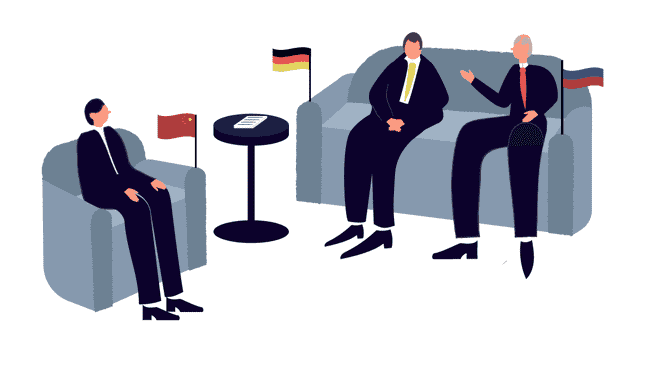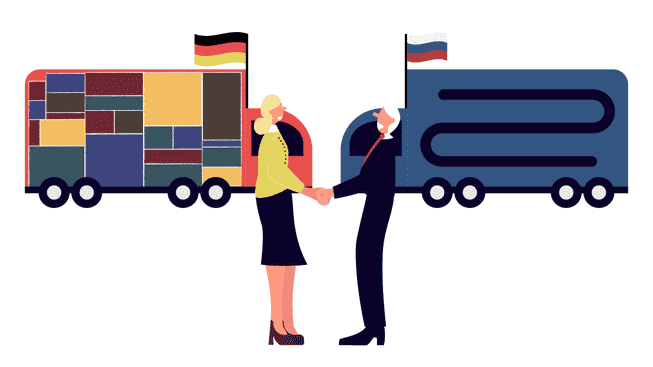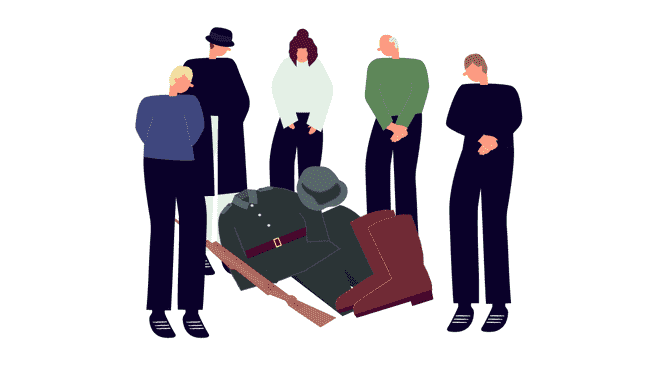The Russian army is targeting Ukraine, but surprisingly pro-Russian tones can still be heard in Germany. What are the reasons for the sympathy for the country?
It was particularly noticeable after the annexation of the Ukrainian peninsula of Crimea by Russia in 2014: Although this clearly violated international law, numerous voices in Germany defended the Russian approach or at least put it into perspective. The war crimes committed by the Russian army in Syria did not appear to have damaged Russian President Vladimir Putin’s reputation among Germans. The same applies to attacks on political opponents, such as the Tiergarten murder in Berlin.
Sympathy or even admiration for Russia: This phenomenon seems to run through all levels of education and age groups in Germany. In the east of the republic it is more pronounced for geographical and historical reasons, but ardent defenders of the Russian president can also be found in the deep south-west. There are five main reasons for this attitude:
The broadcaster Russia Today wants to reach the German audience.
Moscow is actively trying to influence public opinion in Germany. In November 2014, the German-language television channel RT Deutsch went on the air. However, it lacks credibility to reach a wider audience. It is too obvious that the station is a Kremlin propaganda vehicle.
The posts on RT Deutsch often reflect the positions of the far-right AfD, which, along with the Left Party, is the most pro-Russian political force in the Bundestag. Numerous AfD politicians maintain contacts with Russia; in 2020, Russian Foreign Minister Sergei Lavrov received an AfD delegation with party leader Tino Chrupalla in Moscow.
More serious than the pro-Russian attitude of the AfD and the left, which are on the fringes of the political spectrum, is the influence of the Russian gas lobby on politicians from the other parties in the Bundestag. This is felt most strongly among the governing Social Democrats; with Gerhard Schröder there is even a former chancellor on the payroll of the energy company Gazprom.
Although Schröder has been criticized for his activities by party colleagues, the new Social Democratic Chancellor Olaf Scholz also supports the commissioning of the Nord Stream 2 pipeline in principle. Only recently and under the impression of recent events, he moved away from this position a little.

Dragging Russia to the European side in the competition with China: that’s what some German politicians are hoping for.
Germany and India need Russia as a strategic partner against China, said German Vice Admiral Kay-Achim Schönbach recently in a speech in Delhi. Schönbach’s Indian hosts may have remembered that their country worked closely with the Soviet Union during the Cold War, while it is still embroiled in border conflicts with China.
Behind the senior officer’s statement is a logic that is as simple as it is impressive: the enemy of my enemy is my friend. Supporters of the thesis argue that while Russia is in decline, China is on the rise. Anyone who offends Moscow is driving it into the arms of Beijing. Conversely, a Russia that ultimately can only hope to preserve its acquis is easier to deal with than an expansive China that strives to expand its sphere of influence ever further.
The argument may have merit, but it ignores the fact that Russia has long been back on an expansionist course, even if for the time being it is only aimed at countries that were once part of the Soviet Union. It is true that a European peace order cannot be established in the long term without or against Moscow, but at the moment it is Russia that is actively working against such an order.

Whether gas or goods, the two countries are economically intertwined.
Russia is an important trading partner for the heavily export-oriented German economy; economic relations are more intensive than, for example, those between Switzerland and Russia. Nevertheless, a look at the foreign trade statistics puts the impression of close economic ties into perspective.
According to the Federal Statistical Office, Russia was only 15th in terms of exports in the ranking of foreign trade partners in 2020. Russia’s share of total German exports was just under 2 percent. Above all, capital goods such as machines are supplied. In contrast, 8.6 percent of German exports flowed into the most important sales market, the USA. But China, a number of EU member states, Great Britain and Switzerland also bought more from German companies than the Russians.
The picture is similar for imports: with a share of a good 2 percent of total German imports, Russia was in 14th place in 2020. The most important supplier was China with a share of 11.4 percent. However, the composition of imports from Russia is geopolitically explosive: the main imports are crude oil, gas, petrochemicals and non-ferrous metals. A good half of the natural gas that Germany purchases via pipelines comes from Russia. In the event of a conflict, this amount would probably be difficult to replace in the short term. Due to the strong focus on oil and gas, the price fluctuations for these energy sources also contribute to strong fluctuations in German imports from Russia.

Some Germans regard Putin as a strong man who defends traditional values.
Vladimir Putin, shirtless and wearing a cowboy hat, riding through Siberia’s taiga has become iconic. Among other things, it stands for the unabashed demonstration of male strength, which seems rather unusual for Western viewers today.
Many Germans regard the Russian President as a role model for a politician who doesn’t care about the intricacies of Western social debates. On the contrary, he makes fun of them and at the same time portrays them as a threat to “traditional”, conservative, national-patriotic values. That and a robust political style with allegedly clear leadership impress some in Germany who are annoyed by gender asterisks and immigration. In contrast to their own political personnel, they see Putin as a politician who opposes these debates and opposes the USA and its political and cultural influence.
Although other factors on the left play a role in favoritism towards the Russian president, anti-Americanism is also a reason for leftists to like Putin as an anti-mainstream politician. Putin’s propaganda station RT Deutsch takes full advantage of this. The fact that some things look different in Russian reality doesn’t seem to bother the image of the Putin glorifiers.

On the Eastern Front, the Germans brought great suffering to Russia during World War II. This chapter of German history still has an impact today.
When Vladimir Putin spoke in German in front of the Bundestag in 2001, it was also highly symbolic given the history. Every German coming to Russia for the first time is overwhelmed by the openness and friendliness towards the representative of a people who brought immeasurable suffering to millions of citizens of the Soviet Union during World War II. All the more so since the commemoration of the World War is far more present, also in the families, than in Germany.
Many Germans see the deeply felt guilt of the Germans and the gratitude for the unprejudiced, often enthusiastic attitude towards the Germans born later as a duty to cultivate a special, understanding and considerate relationship with today’s Russia. This view is further nourished by the centuries-old fascination for Russian culture and allegedly very special “Russian soul”, also characterized by the vastness of the landscape, as well as the long-standing historical-political connections.
It is often forgotten that the National Socialist war of extermination was not only directed against the Russians, but against all peoples of the Soviet Union – including Ukrainians and Belarusians.
